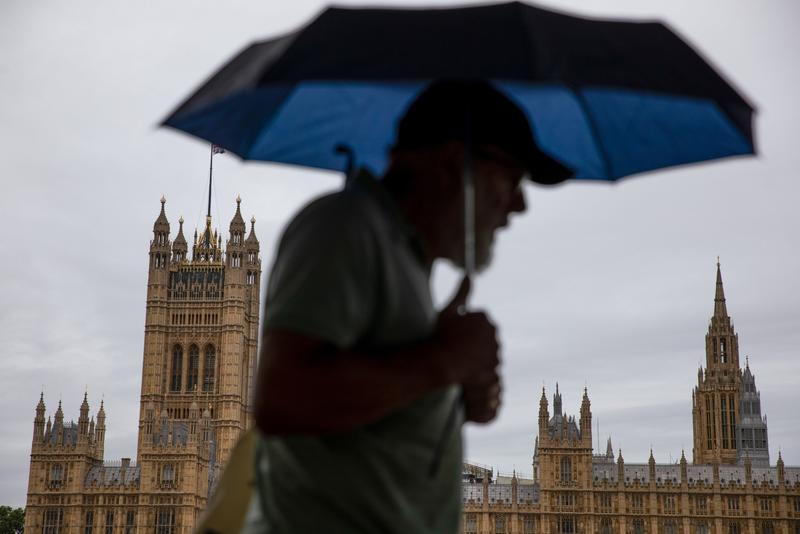 A pedestrian carrying an umbrella to shelter from the rain passes the Houses of Parliament in London, UK, on Tuesday, June 30, 2020. 9SIMON DAWSON / BLOOMBERG)
A pedestrian carrying an umbrella to shelter from the rain passes the Houses of Parliament in London, UK, on Tuesday, June 30, 2020. 9SIMON DAWSON / BLOOMBERG)
LONDON - Britain will continue to engage constructively with the European Union in talks on a future relationship, but London is not willing to give up its rights as an independent state, a spokesman for Prime Minister Boris Johnson said on Monday.
The two sides will resume talks on Tuesday after Britain’s chief negotiator David Frost hosts his EU counterpart Michel Barnier for dinner later on Monday, but there has been little movement on the “significant differences” that divide them
The two sides will resume talks on Tuesday after Britain’s chief negotiator David Frost hosts his EU counterpart Michel Barnier for dinner later on Monday, but there has been little movement on the “significant differences” that divide them.
Britain left the EU in January and is in a status quo transition period until the end of the year, when some companies fear disruption if the two fail to secure a free trade deal.
ALSO READ: British work visa curbs begin to bite
“Our position on our sovereignty, laws and fisheries is clear, we will not give up our rights as an independent state,” the spokesman told reporters.
“We will continue to engage constructively with the EU on these key issues and will work hard to reach the broad outline of an agreement, but as we have been clear all along we are not asking for a special, bespoke or unique deal.”
When Johnson held a video conference with the leaders of the European Union last month, officials on both sides came away optimistic that a deal on their post-Brexit relationship was in sight. That confidence is evaporating.
Informal meetings between the UK and EU’s chief negotiators since then have failed to make progress, according to people with knowledge of the discussions. Privately, EU officials say their attempts to compromise haven’t been reciprocated, while their UK counterparts retort that the bloc’s concessions haven’t gone far enough.
If the two sides fail to reach an agreement, tariffs and quotas will be re-imposed when the UK parts ways with the bloc at the year-end.
Johnson’s video call -- in which he signaled to the EU he was ready to do a deal -- was supposed to encourage the technicians to work toward an agreement at speed. Both sides say the chances of a deal being reached by the end of August are fading fast.
Dinner Dates
In recent weeks, Frost and Barnier have held a series of meetings and dinner discussions. While that has helped to dissipate some of the acrimony between the two that was beginning to creep into their virtual exchanges since May, it has done little to build on the broad landing zone that had already been sketched out.
ALSO READ: EU freedom of movement ends under new UK immigration rules
Barnier had signaled the EU is ready to give ground on the three most contentious topics in the negotiations: EU boats’ access to British fishing waters; how closely the UK will stay aligned to European rules on state aid; and what role the European Court of Justice will play in policing the pact.
The EU side is baffled the UK hasn’t shown any indication of where it is willing to compromise, one official said, adding that recent talks have just gone over old ground.
Part of the UK’s lack of movement can be explained by it believing it has the upper hand. Not only does Johnson appear comfortable with cutting ties with the EU without an agreement, British officials argue that in many areas -- on fisheries, for example -- European countries will eventually believe it is better to swallow the UK’s hard-line position because they would be even worse off than in the event of no deal being reached.
If the two sides can bridge their differences in the three key areas of disagreement, though, both sides acknowledge that an agreement could be ready within weeks -- meaning a deal could still be reached by the EU’s October deadline.
The week’s talks, which conclude at Thursday lunchtime, will also cover areas from energy to security co-operation. A final negotiating round is scheduled for the week of Aug 17 -- but no plans have been made for after that.
READ MORE: Brexit negotiators home in on landing zone despite disputes


